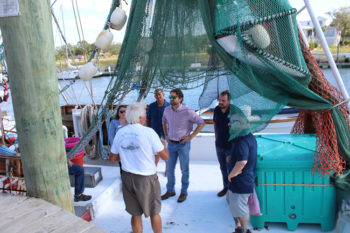Congressman Joe Cunningham represents the First District of South Carolina.
What do you tell people who don’t see the urgency or need to protect and improve the health of our oceans and fisheries?
Fisheries and oceans provide us with jobs, food, and our unique way of life. Here in the Lowcountry, where we are so proud of our cultural legacy as a fishing community, we need to focus on how the health of our fisheries impacts our fishermen and their families.
We live in one of the most beautiful places in the world, in large part because of our beaches. I want my kids, grandkids, even great-grandkids to be able to enjoy the amazing experiences and traditions my own family has made at the beach. And it’s not just me – over half of all South Carolinians participate in outdoor recreation each year.
It’s clear that people from all walks of life and all backgrounds care about the ocean and keeping it healthy for future generations.
If you could wave a magic wand, what changes would you make to ocean policy to improve management of U.S. fisheries? What issue do you feel is most urgent to address?
What a great question! Right now, our fishery management system is working pretty well. It’s certainly not perfect, but it has become a model for the rest of the world.
The issue I am most concerned about is making sure our fisheries can adapt to changing ocean conditions. We know that the impacts of climate change, including warming waters, ocean acidification, and deoxygenation of waters, have put the health of our fisheries under severe threat, by rapidly altering the abundance, productivity, and distribution of fish stocks. Maintaining sustainable management of our fisheries, from ending overfishing to rebuilding stocks to healthy levels, is one of the most critical actions we can take to mitigate these harmful impacts on our fishing communities.
Well-managed fisheries are resilient fisheries, and we’ve got great folks on the ground in South Carolina putting in the work, including NOAA Fisheries, the South Atlantic Fisheries Management Council, the Atlantic States Marine Fisheries Commission, and SC Aquarium’s Good Catch Program. I see it as the job of Congress to help make sure they have what they need to be successful. That’s why I introduced the Climate-Ready Fisheries Act of 2019, which would direct the Government Accountability Office to examine what actions have already been taken by fishery managers, identify whether any knowledge or funding gaps are hindering action, and provide recommendations for how we can better adapt fishery management and prepare fishing industries and communities for the impacts of changes.
How do fisheries resources impact the economy and businesses in your state or district?
Nationwide, commercial and recreational fisheries generate approximately $210 billion in sales impacts each year in the U.S. and are a critical economic driver for thousands of coastal communities. Overall, the ocean economy – which includes everything from coastal tourism, shipping, boatbuilding, and fishing – contributed $4.4 billion to South Carolina’s economy in 2016.
What’s your fondest memory of time spent on or near the ocean?
My fondest memory is definitely meeting my wife, Amanda. Amanda and I met on the water, when we were both working as crew members on a boat. We disagree on when exactly we fell in love – I think it was when we were crossing the Panama Canal, Amanda swears it was several thousand miles later, near Marquesas. It’s been incredible building a life around our oceans, and I cannot wait to teach our son Boone how to surf, fish, scuba dive and share those moments with him as well.




Pingback: Ocean Moment with Congressman Joe Cunningham - Latest Fishing Blogs Posts